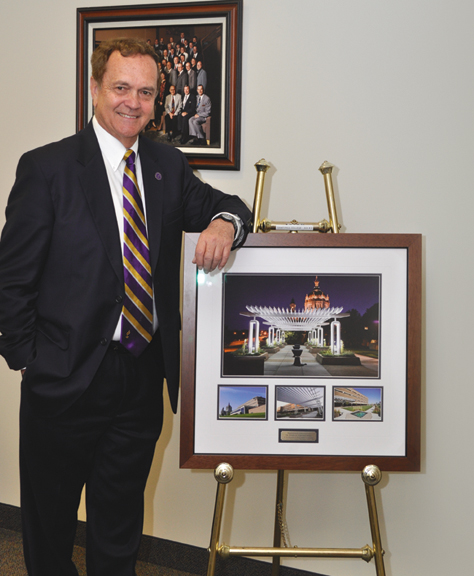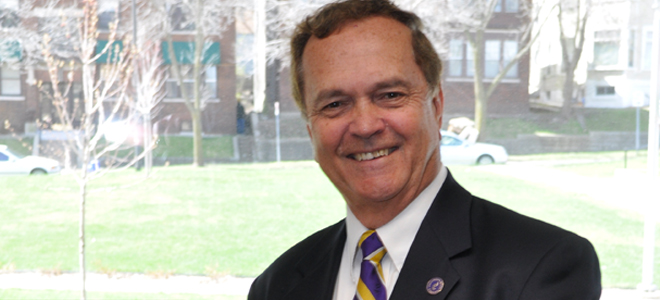 In early 1990, Saint Paul College was in the midst of a crisis. Enrollment was stagnant. A budget shortfall meant that layoffs were looming for more than 40 faculty and staff members. And despite its 80-year history in the city, the college was suffering from an identity crisis.
In early 1990, Saint Paul College was in the midst of a crisis. Enrollment was stagnant. A budget shortfall meant that layoffs were looming for more than 40 faculty and staff members. And despite its 80-year history in the city, the college was suffering from an identity crisis.
For help, the college turned to Donovan Schwichtenberg, who had recently retired after a 30-year teaching and administrative career, including eight years as campus director of Minneapolis Technical College (now Minneapolis Technical and Community College, or MCTC). Schwichtenberg signed a three month consulting contract while Saint Paul College conducted a national search for a new president. But then a funny thing happened: The college began to right itself. Schwichtenberg worked with the institution’s leaders to untangle the budget problems, launch several new programs, boost enrollment and trim the number of layoffs from 40 to six. The initial three-month gig turned into six months—and then into a two-decade career as the college’s president. Under Schwichtenberg’s watch, Saint Paul College expanded, evolved and was eventually named the country’s top community college by Washington Monthly magazine in 2010.
The award came at a fitting time. Schwichtenberg retired—this time for good—in April 2011. But as remarkable and rewarding as his 51-year career turned out to be, the truth is that he initially saw it as a stepping stone to other destinations.
A Changing Future
Schwichtenberg was born on a family farm in Waterville. His family later moved to St. Clair, where he landed a summer job working in a local bank. He stayed at the bank through high school, moving up from mopping floors to running a Burroughs bookkeeping machine to, after graduation, working as a teller for the gaudy salary of $150 per month. “After six months, the bank president gave me a raise to $180 per month,” he says with a chuckle. “I thought I was doing great.”
But Schwichtenberg realized that he had little future at the bank. “The president’s son-in-law and daughter both worked there,” he recalls.“His son was also thinking of joining the family business, and I knew there wasn’t much room for me.”
So after working for a year as a teller, Schwichtenberg quit and served six months active duty with the Army as a member of the National Guard. When his service ended, he enrolled at Minnesota State Mankato in January 1958. His initial plan was to study accounting, but jobs in that field were in short supply, so he switched his major to business education. “One requirement for the degree was that you had to know shorthand. I thought, ‘What the heck, I can learn that,’” he says. “By that time, I’d also decided I wanted to be a lawyer, so I figured I could teach high school in Minneapolis during the day and go to law school at night.”
After graduation, Schwichtenberg accepted a teaching job at the old Central High School in Minneapolis. At 21, he was barely older than his students. Nonetheless, he thrived in the position and found that he enjoyed teaching. Instead of law school, he enrolled in a master’s program in curriculum and development at the University of Minnesota. After earning his M.A. and working at Central for four years, he accepted a position as coordinator of vocational programs at Washburn High School in Minneapolis. It was the first of many such moves; over the next 15 years, he worked at numerous Minneapolis schools and worked his way up to the principal level. He also developed a reputation as a troubleshooter.
“I was the guy they sent in when there was a problem at a school. I’d usually stay in one place for three years or so, help get things turned around and then move on again,” he says. “The city was under a federal order to desegregate in those years, and that was a big challenge for everyone involved. There were a lot of unhappy people on all sides of the issue. But I enjoyed every one of my jobs. I worked with great people and felt like we made some real accomplishments.”
A Final Calling
The experience would prove valuable. In 1982, it helped Schwichtenberg land his position as campus director at Minneapolis Technical College, a job that he thought would be his last in the academic realm. But then he got the call from Saint Paul College in 1990 and found himself with a new set of challenges.
On top of the budget issues, Schwichtenberg understood the college needed to broaden its mission. “People only saw this as a place to go to if you wanted to be a welder, plumber or pipefitter,” he says. “We realized the college had to expand its non-technical offerings. We did a study and saw there were a lot of people in Saint Paul without easy access to post-secondary public education. There were a lot of fine private colleges in the area, but they weren’t the best option if you didn’t have a lot of money.”
 During his tenure, the college remade itself, adding a liberal arts curriculum, setting up transfer agreements with four-year institutions, expanding and renovating its facilities and forging new connections with the local community. Of all the changes, Schwichtenberg is particularly proud of the Power of YOU, a joint program between Saint Paul College, MCTC and Metropolitan State University that provides free tuition for students who meet its eligibility requirements. “It was tremendous to see the Power of YOU work,” he says. “Three years ago, a student in the program told me he’d always believed he wasn’t smart enough to make it in college and that his family couldn’t afford for him to go anyway. Now here he was with a 4.0 GPA, serving as president of thestudent senate and planning to transfer to a four-year university. That was gratifying.”
During his tenure, the college remade itself, adding a liberal arts curriculum, setting up transfer agreements with four-year institutions, expanding and renovating its facilities and forging new connections with the local community. Of all the changes, Schwichtenberg is particularly proud of the Power of YOU, a joint program between Saint Paul College, MCTC and Metropolitan State University that provides free tuition for students who meet its eligibility requirements. “It was tremendous to see the Power of YOU work,” he says. “Three years ago, a student in the program told me he’d always believed he wasn’t smart enough to make it in college and that his family couldn’t afford for him to go anyway. Now here he was with a 4.0 GPA, serving as president of thestudent senate and planning to transfer to a four-year university. That was gratifying.”
Schwichtenberg is quick to add that he wasn’t responsible for the college’s transformation. “I worked with a tremendous group of administrators, faculty and staff at Saint Paul College,” he says. “The local business community partnered with us. Individuals gave donations and volunteered. I never did anything by myself. It always was the result of a lot of people working together.”
Schwichtenberg now lives in Edina but is renovating the 240-acre family farm in Waterville, where he recently planted a vineyard and raises a variety of crops. He’s enjoying retirement, but admits it was hard to finally leave the college last year.
“I had a new three-year contract in my hand, and I was thinking about being around all these students and the coworkers I’d developed lasting friendships with. But I said, ‘No, it’s time. I’m ready to retire,’” he says. “I miss it to this day, but after 51 years, I knew it was the right time.”
Speak Your Mind